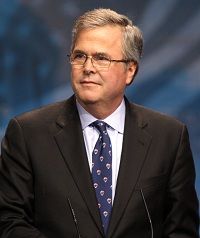Presidential Candidates on Health Care Issues: Jeb Bush
Part of an ongoing series that takes a high-level look at the positions of the leading nominees for President when it comes to political issues potentially impacting physicians, this installment focuses on Jeb Bush.
Over the next few weeks, we’ll take a high-level look at the positions of the leading nominees for President when it comes to political issues potentially impacting physicians.

Jeb Bush is in the midst of a troubled campaign that has included difficulty standing out in the Republican debates, an insufficient fund-raising strategy that has made his overall campaign seem unorganized, and, despite a family name with a rich political history, a struggle to differentiate himself from rivals such as Senator Ted Cruz and political protégé Mark Rubio. But politics, like luck, are fickle, and the former Florida Governor still has a formidable following. But what are his views on health care?
Overall: Unlike some other Republican candidates who have relied on a vague mandate to repeal the Affordable Care Act (ACA), Jeb Bush has provided a detailed alternative that would undo many of the provisions of the ACA, cover fewer of the uninsured, but also strip some of the complexity and Federal control out of the program. Bush’s plan would offer income-tax credits for people to buy catastrophic coverage and offer states funding to finance care for low-income people. Although many of the tenets of the Bush plan are aligned with the Republican party’s “repeal Obamacare” mandate -- including giving states more discretion and authority to regulate health insurance -- there are some unique aspects to his plan as well. For instance, he would cap the amount of tax-free health benefits that employees can receive from employers, a significant shift from the current system, under which the value of employer-sponsored insurance is not counted or taxed as income for employees. Among the goals of the Bush plan are to make the consumption of health care more reflective of the actual costs of the services rendered.
Abortion: Bush is often seen as a “moderate” on abortion by strong pro-life advocates, and he generally has not made his pro-life views a centerpiece of his policymaking goals. But he is strongly pro-life, which is reflected in his record as governor of Florida. In August, Bush told Slate, “My record as a pro-life governor is not in dispute. I am completely pro-life and I believe that we should have a culture of life.”
Other issues: Though he has not made it central to his campaign, Bush has expressed that he would like to overhaul Medicare -- what he calls a “reform” rather than an elimination of the program. He is generally in favor of a voucher system similar to the one proposed by Wisconsin Congressman Paul Ryan. He has some experience in this area, including a 2006 overhaul of the state Medicaid program in Florida. Bush has touted the program as a success, but some analyses have questioned the overall effect of the program.
Photo credit: Gage Skidmore